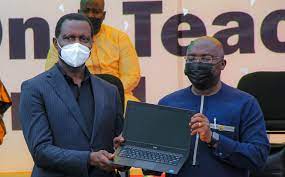In Ghana, the conversation around quality education is ever-present, and Vice President Bawumia's recent proposal to provide laptops to high school freshmen and sophomores has sparked considerable discussion.
At first glance, this initiative may seem promising, especially in the context of our digital age. Yet, skepticism lingers among many citizens, particularly as this announcement emerges close to election season.
There’s a growing sentiment that such grand promises may not align with past experiences. For instance, the "one teacher, one laptop" initiative faced significant challenges and ultimately did not meet its goals.
If the management of a smaller group proved problematic, one might wonder about the feasibility of extending similar support to a much larger student population.
This pattern of ambitious announcements often leads to disappointment. While the government seeks to capture public attention with bold initiatives, the follow-through tends to lack the necessary substance.
There are critical foundational issues in our education system—like outdated facilities, inadequate resources, and the need for better teacher training—that often go unaddressed in favor of more visible, yet superficial, projects.
The recent laptop initiative appears to be another example of this approach, drawing focus away from pressing issues within our educational framework. Questions arise about the transparency of the procurement process and the logistics involved in distribution.
Such concerns could hint at deeper systemic challenges that may undermine the effectiveness of this program.
Moreover, there’s an ongoing need for solutions that are sustainable and genuinely address the long-term needs of students and educators alike.
Quick fixes, while appealing in the short term, may not contribute to the kind of substantive improvement that Ghanaian students deserve.
As we examine the motivations behind these initiatives, it’s essential to look beyond the headlines. While the prospect of digital tools for education is exciting, the real measure of progress lies in the strategic planning and genuine investment in our schools.
Ghanaians aspire to more than just well-intentioned proposals; they seek actions that lead to meaningful change.
Ultimately, it’s crucial for our leaders to focus on building trust through consistent and effective governance.
The people of Ghana deserve a commitment to deep, lasting reforms that prioritize the needs of students over mere political gains.
It is time to elevate the conversation around education and ensure that initiatives truly reflect a dedication to progress rather than a fleeting spectacle.
Latest Stories
-
I want to focus more on my education – Chidimma Adetshina quits pageantry
3 hours -
Priest replaced after Sabrina Carpenter shoots music video in his church
3 hours -
Duct-taped banana artwork sells for $6.2m in NYC
3 hours -
Arrest warrants issued for Netanyahu, Gallant and Hamas commander over alleged war crimes
3 hours -
Actors Jonathan Majors and Meagan Good are engaged
3 hours -
Expired rice saga: A ‘best before date’ can be extended – Food and Agriculture Engineer
3 hours -
Why I rejected Range Rover gift from a man – Tiwa Savage
3 hours -
KNUST Engineering College honours Telecel Ghana CEO at Alumni Excellence Awards
4 hours -
Postecoglou backs Bentancur appeal after ‘mistake’
4 hours -
#Manifesto debate: NDC to enact and pass National Climate Law – Prof Klutse
4 hours -
‘Everything a manager could wish for’ – Guardiola signs new deal
4 hours -
TEWU suspends strike after NLC directive, urges swift resolution of grievances
4 hours -
Netflix debuts Grain Media’s explosive film
5 hours -
‘Expired’ rice scandal: FDA is complicit; top officials must be fired – Ablakwa
5 hours -
#TheManifestoDebate: We’ll provide potable water, expand water distribution network – NDC
6 hours

